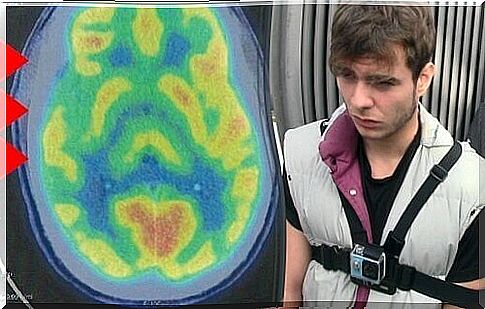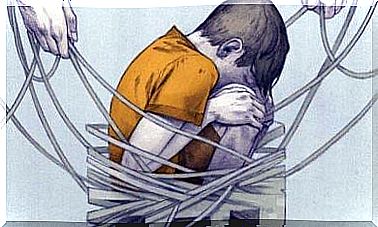Can A Brain Abnormality Make You A Psychopath?

Patrick Nogueira killed his uncle, aunt and cousin at his home in Pioz, Spain. Some believed he did it because he has a brain abnormality that impaired his cognitive skills. However, the jury found him guilty. They believed Patrick was a psychopath who knew exactly what he was doing.
Can a brain abnormality or injury suddenly turn a person into a psychopath capable of murder? Can evil be explained biologically?
This incident was noteworthy in Spain as it was the first time that criminal defense attorneys used neurotransmission to justify a crime. In the United States, however, brain imaging has been used for years to explain why criminals have limited self-control. The justice system uses these scans to decide whether a person should serve their sentence in prison or in a psychiatric facility.
Brain abnormality and legal system
For example, the American Association of Judges has accepted such investigations as evidence for more than 27 years. The most famous case was Herbert Weinstein, who was accused of strangling and throwing his wife off the balcony in 1992. Looking at Weinstein’s brain images, the judges ruled that a cyst in his arachnoid membrane could have caused what he did.
However, many psychologists point out that psychopaths are not just mental health problems. The psychopath knows the difference between right and wrong. In addition, psychopaths understand that their actions are immoral, but they do them anyway. What they don’t take into account when they make decisions is the suffering of other people.

What neuroscience says about brain abnormality and violent behavior
Doctors performed various neurological tests on Pioz’s murderer. His PET scan showed that he had low nervous system activity in different areas of the right temporal lobe. Patrick Nogueira said it was because he hit his head as a teenager. He also told the judge that he had been drinking alcohol since he was 10 and that he was bullied at school.
Psychiatrists said such atrophy of the brain could be a clear sign of sociopathy. They said that the neurological injury in question had clear effects on behavior. In 1997, Dr. Adrian Raine and Monte Buchsbaum conducted a study that showed correlations between brain abnormalities and violent behavior. Other studies have found the same correlation.
The case of Phineas Cage
One of the best known cases in the history of medicine is Phineas Cage. This case is often used as a reference by both psychiatrists and neuroscientists. On September 13, 1848, Gage worked for a gang that built a railroad for Rutland and Burlington in Vermont.
As the team split a large rock, the explosion broke a very long iron bar that penetrated Phineas Cage’s skull and got stuck there. The rod went in from the left side of his head, passed behind the eye, and came out through his left cheek.
- Cage never lost consciousness. He spoke and moved normally. He went to see Dr. John Martin Harlow, who put him under observation after he had removed the iron rod. Dr. Harlow was amazed at what had happened.
- After about two months, Phineas Cage returned to his normal life. Apart from the loss of the eye, the accident did not appear to have any other side effects.
- However, Dr. Harlow continued to follow Cage for the next 20 years. He described how young Cage was never psychologically the same after the accident. According to the doctor, he became aggressive, impulsive, rude, immoral and irresponsible.
- Phineas Cage became another person. He switched from one job to another and even joined the circus. In the last years of his life, he suffered from severe epileptic seizures. He died at the age of 38 years.
Renowned neurologist Antonio Damasio is one of the experts who is studying the Cage case the most. He noted that damage to Cage’s forebrain could change his personality, emotions, and social interactions.

Brain abnormality: what psychologists say about its effect on behavior
Many psychologists acknowledge that brain abnormality does not always affect behavior. In other words, it may predispose a person to a certain behavior, but it is not certain.
Criminologist and psychologist Vicente Garrido explains that brain failure or injury does not automatically turn a person into a killer. A brain scan can’t show us someone’s thoughts or what they can do.
There are many crucial factors. In addition, only a small percentage of psychopaths end up committing murder. The reason for this is quite simple: they can choose right or wrong.
The case of James Fallon
One of the most interesting studies on the neurobiology of psychopath is James Fallon. This neuroscientist at the University of California is one of the leading experts in sociopathy. This person, of course, is not a murderer, nor has he committed any acts of violence.
Nevertheless, there is something special about Dr. Fallon. He has a psychopathic gene and an anatomical abnormality that corresponds 100% to the personality of a sociopath. In addition, there have been at least seven murders in her family, including the very famous Lizzie Bordon, who murdered and cut her family to pieces.

James Fallon lives a normal life and has never committed any crimes. He talks about psychopaths, sociopathy, and his own story around the world.
What conclusions can we draw from this? Can a brain abnormality make you a psychopath? Can it make you commit horrific crimes like the murder in Pioz? To date, we do not yet have clear answers. However, one thing is pretty certain: a brain abnormality can predict certain behaviors, but there is no certainty that it will lead directly to horrific crimes.









